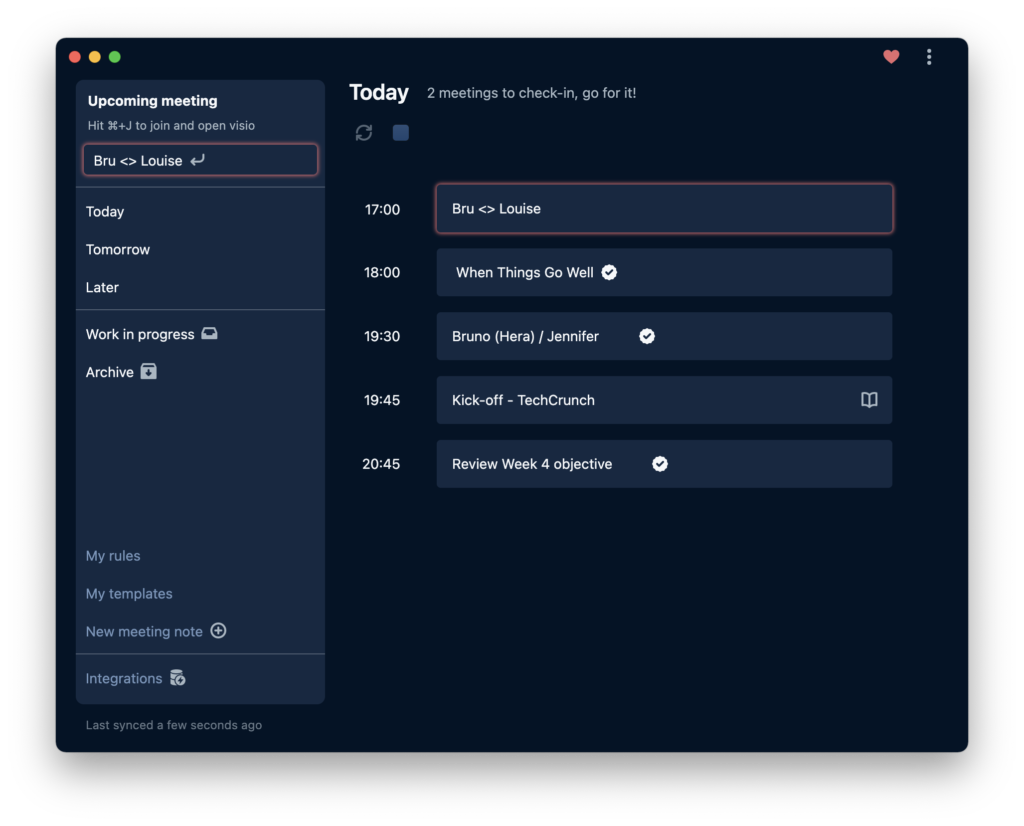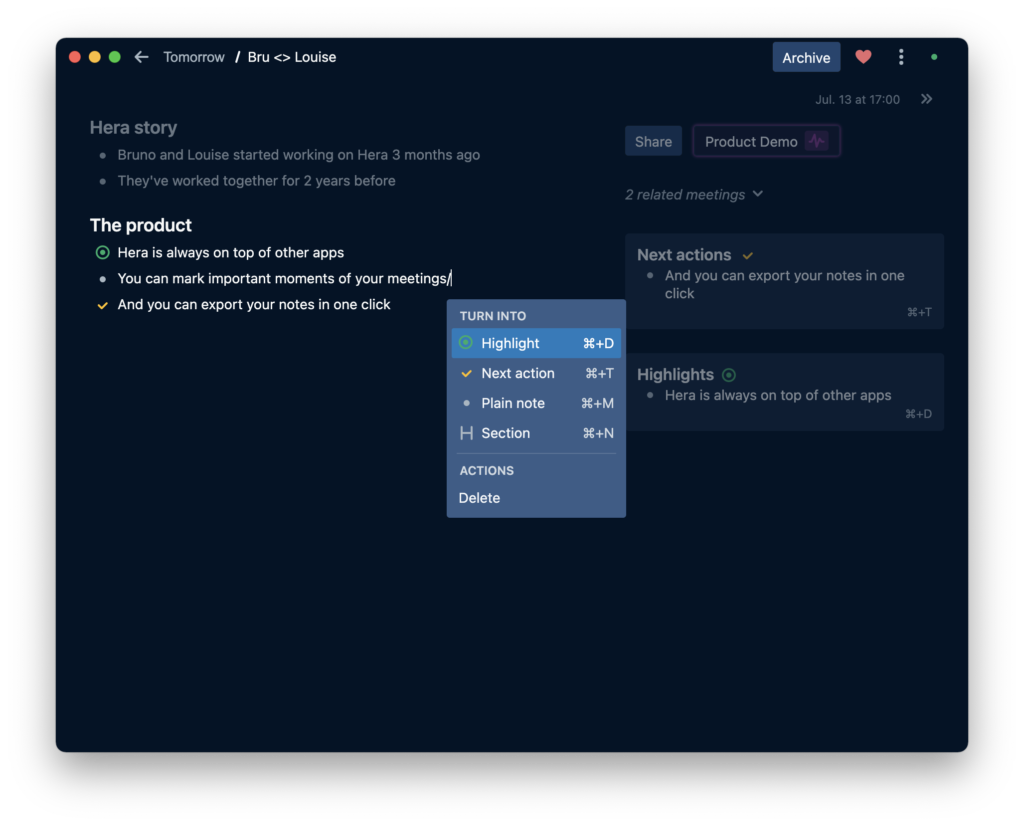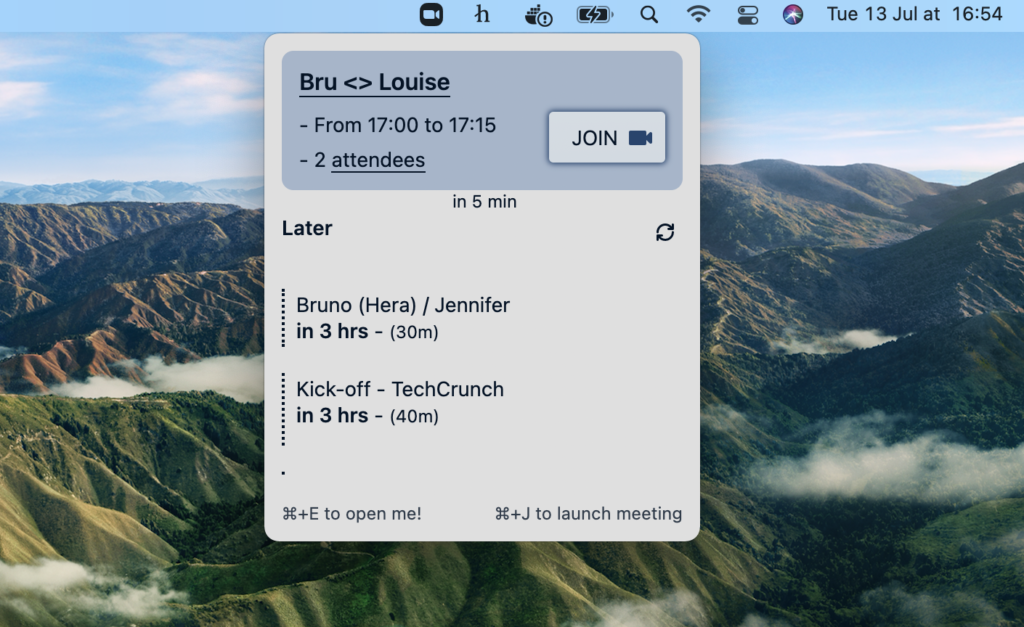Welcome to a new edition of our interview series, where we explore the vision of founders of tools for thought. In this edition, we had the opportunity to learn from Bruno Vegreville, the co-founder of Hera. The team at Hera is on a mission to help people take back control of their time, and more specifically of their meetings.
We have all been stuck in a useless team catch up, been invited to a presentation without any prior context, or been frustrated trying to find old meeting notes to get up to speed. Bruno and Louise are hoping these will soon be a thing of the past.
Bruno is deeply passionate about productivity and learning how to learn. After studying computer science and machine learning at École Polytechnique in Paris, he worked as a machine learning engineer in various healthcare start-ups. He then became a product manager where he worked with Louise Bayssat for more than two years. The two soon decided to build Hera.
In this interview, we talked about the problem with traditional calendars and the way we manage meetings, the life cycle of a work event, the importance of note-taking and written communication, the future of work, why we need to unleash our digital footprint, how to build a productivity inbox, and much more. Enjoy the read!
Hi Bruno, thank you so much for agreeing to this interview. Hera was created to remove the frustration we all experience when managing meetings. Was that based on personal experience?
Louise and I had highly collaborative roles in our previous jobs. We felt something was off when we saw our productivity and energy levels plummet after spending a good chunk of the pandemic in back-to-back meetings. And we knew we were not alone when terms like “Zoom fatigue” started to spread virally.
The company we were working at had a great written communication level and was intentional about the process. However, for some reason, meetings never got the same attention and suffered from extremely volatile efficiency. Louise and I decided to change that, and we resigned to build Hera.
We spent the first few months interviewing people to clarify the pain points and to validate our hypotheses for an initial solution. We reached out to our network and always asked for a referral at the end of the interviews. That’s how we got to interview more than 150 people in the first month. So, building Hera was based both on personal experience and on the experience of the many people we talked to.
Back-to-back meetings can indeed be incredibly draining. But can’t we just better manage our calendars?
Calendar tools never really grasped the profound difference between physical and virtual meetings. These tools are heavily centered around scheduling, which is a small fraction of a meeting’s life cycle. The result is that looking at your overly-packed calendar will not inform you on what is important, what is not, what should be prepared, which meetings need follow-up. The fact that your note-taking tool is disconnected from your calendar makes it even harder to understand what happened, or is about to happen, in a given meeting.
The main gap is that calendars handle “events” — isolated entities spread across time. But the vast majority of meetings are part of a broader project. Failing to group related meetings together puts too much pressure on the user to figure out the prior context related to a meeting.
In addition, the products we use everyday to collaborate have not been designed based on guidelines on how to efficiently run meetings. People don’t wake up one day understanding ex nihilo what good preparation or good note-taking can bring to a meeting. As a result, preparing, running and extracting actionable outcomes for a 40-minute meeting can cost up to two hours of work, wasting precious mental energy that could be better spent elsewhere.
And how does Hera address these limitations?
We want to help people take back control of their time. With Hera, users can prepare, join, and run meetings without the grunt work. Hera syncs with your existing calendar and lets you act on your meetings at each stage of the life cycle: no more separation between your calendar meetings and what has happened in these meetings. We display every meeting next to other related meetings — kind of like a thread of emails, but for your meetings. That way, users always have the right context when they join a meeting.
By scanning your calendar, we also automate low-value repetitive tasks. Let’s say you are interviewing customers for a project, and your calendar is filled with meetings called “User research with [John]”. You can ask Hera to automatically apply a template to all of these meetings. You can then just join the meeting in one click, find everything you prepared in advance, and take notes. The note-taking experience is optimized for meetings. For instance, you can add highlights and action items without ever leaving your keyboard.
At the end of the meeting, users can export the outcomes or full notes to other tools such as Notion, Slack, or Todoist to feed a broader source of truth. This allows for seamless collaboration.
People are also frustrated by the number of tools they need to juggle. It’s great that Hera works with other tools.
We deeply care about the effects of tool fatigue. While Hera is the single point of capture during meetings, users can export the outcomes to external tools in one click. Even if our power users end up keeping their notes inside Hera, we want to make it easy to make meeting outcomes live wherever they can have an impact.
To avoid the “we help you but you need to add a new tool” dilemna, we are going to progressively support the majority of the features you find in traditional calendar tools. This way, users will be able to close the typical always-opened Google Calendar tab and to manage all of their meetings from Hera.
Hera seems to be great for remote teams. Is that something you had in mind?
That’s a great question! Hera is a direct consequence of the covid pandemic, so remote work was obviously on our mind, and more specifically the impact it has on the amount of meetings people get, which is an additional 13% per person.
I believe that an increasingly large number of companies will transition to full remote work. The main question is how can we unlock the ultimate version of collaboration in this new setting?
The transition to hybrid or full remote work is not a smooth ride for most companies, and meetings tend to become the weird lifeline to keep the team “connected”. Unfortunately, it often means replicating meeting practices — that were not even helpful in a physical setting — to a more challenging remote setting.
Despite being at the very beginning of our product roadmap, Hera has proven to be a game-changer for several users in remote companies, as the concepts of asynchronous preparation and writing down outcomes of meetings are embedded in the product.
On a side note, I believe writing down ideas in an articulated way is a rare skill. My take is that many companies will discover that enabling an efficient written communication culture across hundreds of employees is as hard, or harder, as supporting a healthy meeting culture.
That’s a great point. How do you think these challenges will impact the future of work?
Five to ten years from now, I believe many companies, especially tech companies, will be decentralized, or at least not physically bound. In these companies, written knowledge and efficient collaboration will be the two most important facets of the culture of the company.
The major challenge is to bring the cost to collaborate with your teammates to zero. We are far from there, and it will require deep collaborative features within the tools people use to work, instead of relying on additional communication tools such as Slack. On top of that, these in-product collaborative features will need to talk to each other in order to feed the higher-level company knowledge base.
The future of work will reach a significant milestone when our digital footprint will stop being siloed by tools. We spend our days on our computers, generating small footprints — I visit this website, I open this document, I call this person… I should be able to share a subset of these footprints to products I use, so that these products can automate stuff for me, or so they can better understand the bigger picture of what I’m working on.
Some companies, especially remote ones, are advocating for work without meetings. Do you think that’s possible at all?
First, we are big fans of these companies as they are among the first ones to challenge the status quo, and in this case to challenge the fact that it is not okay to spend your days in meetings without feeling productive.
Advocating for work without meetings is a very natural response to inefficient meetings. That being said, it seems to me that we are throwing the baby out with the bathwater. A well-prepared 20-minute meeting to sync on a complex topic that leads to a couple of major decisions is actually a very efficient way to collaborate. Right now it requires too much discipline for most people to set-up a meeting for success, and this is what we want to make easier with Hera.
Let’s talk about you. How do you use Hera personally?
As an early-stage co-founder, I am actually right within Hera’s target audience! I have meetings on product, hiring, growth, fundraising, and I need to stay relevant and active during these discussions.
Typically, I start my day by checking Hera Instant Join, an app in my MacOS menu bar, to see the meetings I have for the day. I take 15-30 minutes to prepare the most important ones, and I usually apply custom templates to the others. I don’t like to take long meeting notes so I often mark a few notes as “Highlight” and “Next actions”, which helps take a good snapshot of the meeting.
I use the Inbox in Hera as a to-do list that I scan a few times a day, conveniently always one keyboard shortcut away. At the end of the day, I share relevant meeting outcomes with the team, and I keep the rest in my personal library.
That sounds like a very productive day! Beside using Hera, do you have other productivity tips to share?
There are thousands of productivity systems depending on your personality, ambitions, and natural skills, and absolutely no one-size-fits-all system. What I have seen to work repeatedly over time is having two sacred places: a place to capture information and tasks, and a place to execute on these tasks.
The “capture” place can be arbitrarily messy. The only crucial attribute is that it should require absolutely no effort to put information in it. If you need more than two clicks to write something down, you will not do it consistently. The “execution” place will work best if it’s clean and only reflects your priorities for the day or week.
With these two places emerges a virtuous cycle of productivity. First, capture all relevant bits of information you see during your days. Then, regularly use what you have captured to define 3-4 priorities to execute on. You can then narrow down your focus on these priorities without being distracted by the dozens of other topics you have on your plate.
A double productivity inbox… That’s very helpful. Thank you so much for your time, Bruno! Where can people learn more about Hera?
If you are interested in Hera’s broader vision, you can have a look at this article or watch this product demo. To try out the product, you can sign up here.
We are building Hera in public, so if you would like to follow the ups and downs, feel free to follow Louise and myself on Twitter!



